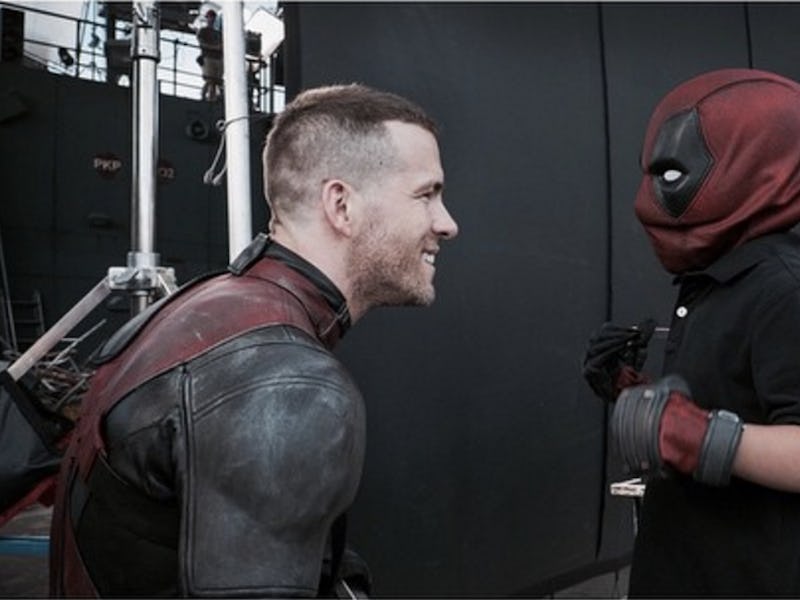Can Deadpool Become a Mascot for the Cancer Community?
Marvel's Merc with a Mouth suffers from the disease in his own vulgarian way, and that might help.

Comic books should be a means of escape. Their tales of people running (or flying) around with superhuman abilities are meant to repackage ageless mythological archetypes in a contemporary pop framework. They’re supposed to take your mind off the sometimes harsh realities of life. But other times comic book characters and their storylines address some surprising real-life topics that incorporate those realities into a seemingly fictional mythos. Superheroes have had to battle life-threatening diseases like cancer before — most notably in series runs of well-known characters like Spider-Man, Superman, and the original Captain Marvel. But nowhere are the ramifications introduced with as much of an absurdist slant than with the character Deadpool.
With his very own big-screen adaptation starring Ryan Reynolds coming in mid-February, could the cancer-ridden Merc with a Mouth be a real exemplar of cancer awareness? It isn’t as ridiculous as it sounds.
For the uninitiated, Deadpool’s real identity is Wade Wilson, a former military special forces soldier who attempted to curb [his cancer diagnosis](http://marvel.wikia.com/wiki/Deadpool_(Wade_Wilson) by taking part in a special government super soldier project called Weapon X. People with a passing familiarity may recognize this shady program as the same one that gave fan-favorite Wolverine’s indestructible Adamantium claws. Whereas Wolverine was able to get the claws because of his mutant healing ability, Wilson underwent a process that grafted Wolverine’s healing abilities onto his own cells to induce a mutation of his own superhuman healing abilities.
But Wilson’s cancer isn’t that cut and dry. Between all the patented wisecracks and R-rated carnage is a character that, weirdly enough, represents the plight of people fighting cancer everywhere. Regardless of the fuzzy science behind it all, Wilson’s fundamental healing power was meant to replace his body’s cells as they were being destroyed. His body is in a constant flux of repairing itself, which is why he remains scarred, forcing him into wearing his mask. If he became cancer-free, his body would produce an overabundance of new cells and cover his whole body in tumors. In effect, the cancer is essential to his superpower. He can’t be cured of his cancer. That imbalance would kill him.
Cancer is something Deadpool and Wade Wilson have to live with, which — at the risk of sounding absurd because we’re talking about how this relates to a foul-mouthed comic book character — is something essential to the cancer experience for not only the person diagnosed with the disease but also their friends and family.
It’s arguable whether the new movie will significantly address these themes. It’ll most likely be too busy upping the R-rated action and Reynolds quips to really try something meaningful. Besides, Deadpool is the type of character who breaks the fourth wall to directly address the reader or the audience, and when he does, you definitely don’t want him to lecture you about devastating diseases. You want him swearing, shooting bad guys, and smart assing his way through a few killings. For his part, Reynolds has been appearing in costume at hospitals to visit Deadpool fans fighting cancer and posting the meetings to his Instagram account. Hopefully the idea isn’t that these kids revere this potentially insane anti-hero because of his actions, it’s because they at least connect with the character on a medical level.
But at least he’s there as a representative, and in a sense it’s all about representation. Deadpool’s no-nonsense smart-assed approach, though fictional, is nonetheless similar to the type of confrontational rallying cry of alternative foundations like entrepreneur Yael Cohen’s non-profit “Fuck Cancer” organization. It’s a millennial-focused support network whose name says it all.
When she spoke to Forbes in 2014, Cohen explained that the mantra behind “Fuck Cancer” was about reaching people “to speak their language,” and to approach such a tough subject with “humor, wit and edge.” She continued by saying “you have to be honest, authentic and bold” when confronting such a traumatic disease. “Fuck Cancer is not sexual or violent; it’s defiant and defeated simultaneously,” she explained. “People join our movement because they instantly resonate with our name and our ethos.”
It’s a no-bullshit spirit that confronts a distressing situation, and whose sentiment can be found in Deadpool’s same anarchic humor. It may seem like a stretch, but a superpowered mercenary might just be the hero the cancer community has earned.